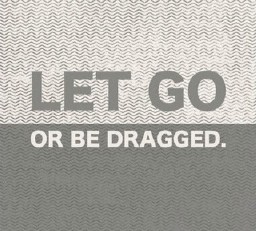Words of Wellness

February 26, 2016 | The Rev. Dr. Scott Stoner
"Let Go, or Be Dragged"
Last week I wrote about both the challenges and the importance of learning to "let go." This week I heard an expression related to letting go that I had never heard before, one I think I will remember for a long time. The expression is, "Let go, or be dragged."
When I heard this I immediately had a flashback to the first time I went downhill skiing. I was ten years old and I, of course, started on a small hill, needing to take a rope tow to get to the top. I had no problem grabbing on to the rope and enjoyed being pulled up the hill. When I got to the top though, I panicked and clutched ever more fiercely to the rope, even though the signs clearly said it was time to let go. Finally, I crashed though a safety gate and my skis and poles went flying in opposite directions as I tumbled to the frozen ground. That was my first, and probably most obvious, lesson in the wisdom captured in the phrase "Let go, or be dragged."
The expression, "Let go, or be dragged" is simple, powerful, and direct. It doesn't tell people that they must let go. It simply tells them what the natural consequence will be if they choose not to do so.
Consider a relationship that is not working for you. Perhaps you have been giving and giving in this relationship, in order to try and get the person to appreciate you, but nothing you do seems to work. It seems that the more you give, the less you get. At some point, it may become clear that it is time to let this relationship go. At this time you may realize that if you don't, you will most likely be dragged down by your fruitless efforts at being the only one trying to improve the relationship, a difficult but helpful awareness.
Perhaps you are experiencing the truth of "let go or be dragged" in a situation where you are trying to help someone make a change. Perhaps you are working hard to get a person with an addiction or some other self-destructive behavior to stop doing what they are doing. This can be a problem if you find yourself working harder than they are in the attempt to create a healthier life. They may experience you as "inflicting help" and resent your efforts to change them. At some point you may come to the difficult realization that it is time to "let go or be dragged."
Perfectionists are people who have excessively high standards for themselves and others. Over time, they can wear themselves out, and others, too. While having goals and high standards can be motivating, perfectionism ultimately becomes disabling because it sets standards that are impossible to meet. If a perfectionist at some point does not learn to "let go" they will drag themselves down and others with them.
You no doubt have your own examples to add to this list. Just as I did with the rope tow on my first attempt at downhill skiing, most of us probably had an unfortunate experience of holding on to something longer than we should have done so. Many of us have over the years seen others and/or have experienced for ourselves circumstances where we have learned this truth the hard way. Yet those experiences are a great reminder to us now to be aware of those situations in our lives where we may currently be vulnerable to holding on for too long. Just remember, don't hold on to that tow rope too long!
Subscribe Now to Weekly Words of Wellness
Donít wait another day! Enter your e-mail address below to signup for the e-mail version of Weekly Words of Wellness. Rev. Dr. Scott Stoner covers a new topic each week providing insight and wisdom for our everyday lives.
You can unsubscribe at any time.

